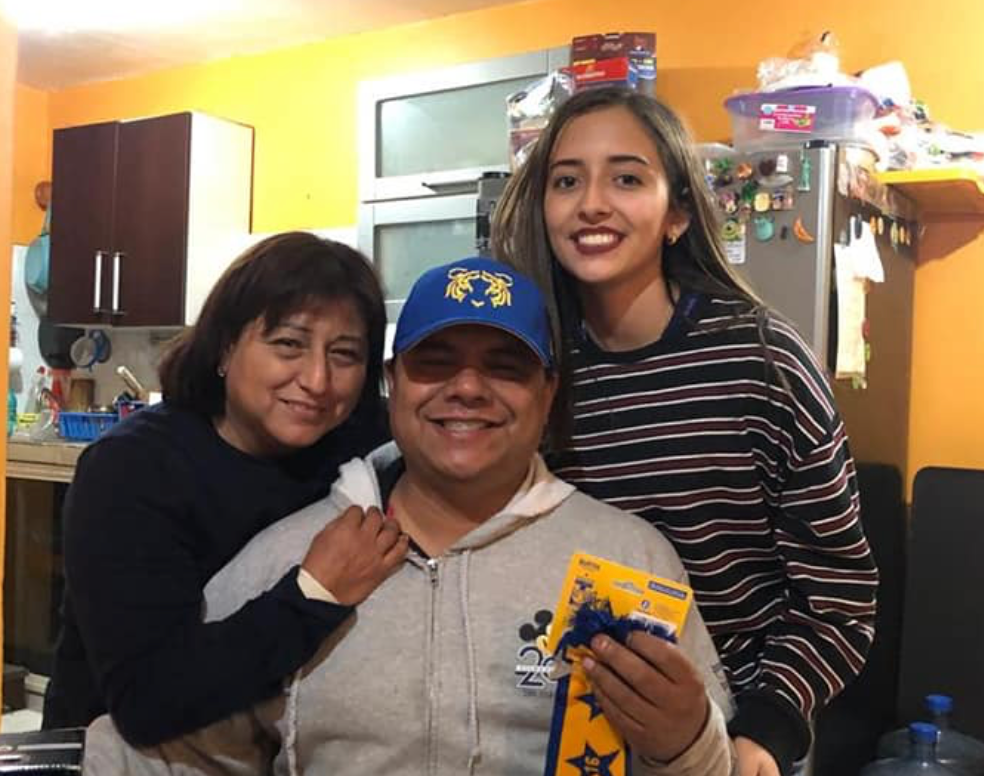Debanhi Escobar’s father on his fight to find the killer who dumped her body in a Mexico motel cistern
EXCLUSIVE: Authorities believe Debanhi Escobar ended up dead in a water tank by accident. In an interview with Independent en Español, her father, Mario Escobar, tells José Luis Montenegro why he’s convinced that’s a lie

"You would have to live it to be able to feel it," says Mario Escobar, whose 18-year-old daughter Debanhi vanished after leaving a party three weeks ago in Nuevo León, Mexico. After 13 days of searching, the law student’s body was found decomposing in the cistern of a motel in the city of Monterrey.
In an exclusive interview with Independent en Español, translated from Spanish to English, the heartbroken father says: “I can’t explain it to you. In short, I am devastated. It is very difficult for the family, but we are fighting to preserve the dignity, the name and to find justice for my daughter.”
Debanhi Susana Escobar Bazaldúa’s disappearance made international headlines after a haunting photo of her standing by the side of a desert highway just hours before she vanished on 9 April went viral.
Her parents shared the photo through her Instagram to announce that she was missing, marking the beginning of a long and ongoing road of pain, controversy and questions for the family.
"For people who wonder if this photo is real, yes it is real, it was the last time Debanhi was seen, we have had this photo since the morning of April 9," read the caption on the post, which showed Debanhi was wearing a white top, loose black high-rise pants, black Converse tennis shoes, and her hair down.

In a cruel stroke of irony, it later emerged that Debanhi had joined thousands of women in a march against gender violence in Nuevo Léon just a week earlier on International Women’s Day.
Debanhi’s father laid out the timeline in his interview with Independent en Español, telling how she had gone to a party in Las Quintas de la FGR (Office of the Attorney General of the Republic) in the Nuevo Léon city of Escobedo - at around 12.20am on 9 April.He said they were having fun until some kind of argument took place. She then left the party at 4.21am.
Just three minutes later she appeared alone on the road, in that emblematic photograph viewed across the world.
According to Mr Escobar, Debanhi’s friends had called a “trusted contact” to pick her up from the party and take her home. That contact was later identified by police as taxi driver Juan David Cuéllar, who works for the ride platform Didi but had picked Debanhi up "outside the application”.
In an interview with Azteca Noticias, Mr Cuéllar said that he’d met Debanhi and her friends earlier in the night when they requested a DiDi ride from San Nicolás to Las Quintas de la FGR, where the party took place.
“One of Debanhi’s friends asked me for my phone number to contact me and take them home once the party was over,” he said. “I told them yes, as long as it was close to where the event was.”
He said the friends contacted him at around 4am, but when he arrived, only Debanhi got into his car while the others left in another vehicle.
Mr Cuéllar indicated he did not know why Debanhi left his car minutes later on the Monterrey-Nuevo Laredo highway. "The only thing she commented on is that [the other girls] were bad friends because they hadn’t wanted to take her [to their house],” he said.
But Mr Escobar has claimed to have images showing that Mr Cuéllar had tried to reach into the backseat and grope Debanhi. He explained that claim to Independent en Español:
The authorities told you that images from the nearby security cameras suggested that the driver touched your daughter inappropriately. Has this been verified?
Mr Escobar: “No, it is in the process of being verified and, if it is verified, it would change from a ‘disappearance’ to a ‘femicide with a gender perspective’. That is what is going to be analyzed and that is what [authorities] will determine, if it can be classified as a type of harassment [that] triggered my daughter to get out of the DiDi service unit."
At approximately 5am, security cameras of a motel on the Monterrey-Laredo highway recorded Debanhi getting out of the vehicle. She was seen entering the premises of the Alcosa Transportes Internacionales trucking company, but was never seen leaving there.
What happened inside Alcosa Transportes Internacionales? According to the footage, Debanhi enters the premises but is never seen leaving. There is talk that there are several minutes missing from the security cameras that could not be justified.
Mr Escobar: “That’s right. As a result of Debanhi getting out of the vehicle, she goes to the Alcosa company to ask for help or, perhaps, to make a phone call. They must know that, on that road, if you walk 800 metres forward, there is nothing; and if you walk backwards, there is also nothing. She was trying to get help. It seems to me that they are investigating inside the company to find out if there is any inconsistency, because in several recordings that they have on their security cameras, there are a few minutes missing. We will have to wait and see how they build their case to be able to justify the missing minutes.”
After several days of searching with around 200 officers, drones and dogs, authorities failed to find any trace of Debanhi.
Finally, on the night of 22 April, her body was found in the underground cistern of the Nueva Castilla Motel in Escobedo, a block and a half south of the Alcosa company, after staff complained of a foul stench coming from the water tank.
Mr Escobar responded to the gruesome discovery by attacking the forensic experts, shouting at them over and over: “They were here for thirteen days! How many times have you been here? Tell me! How many times have you been here?”

The property had been searched at least four times before the odour report sparked a fifth and final sweep.
While authorities believe Debanhi accidentally fell into the 12-foot (3.6-metre) cistern near the motel pool and drowned, Mr Escobar maintains that his daughter was "beaten and strangled".
Mr Escobar is convinced that "there was negligence on the part of the State Prosecutor’s Office for the Disappeared” but is confident that a review of the case will result in necessary measures.
Authorities say your daughter had been submerged in water for almost two weeks, leaving her body unrecognizable. She was identified by a crucifix necklace and the clothes she was wearing. What is your opinion of this analysis of the local security authorities?
Mr Escobar: "They killed my daughter and planted her.”
Authorities say that the presumed cause of death is a "deep contusion in the skull". Do you accept that?
Mr Escobar: "No, of course I don’t accept it."
You hired an expert to do an independent investigation. What progress have you been able to make in clarifying what happened?
Mr Escobar: “We have the expert opinion that the [independent] person in charge of the autopsy [gave], we already have it at hand and, in due course, we will give it to the Nuevo León Prosecutor’s Office and the authorities to compare what they said and what the independent coroner commented".
Is there any evidence or indication that the authorities have mentioned that contradict with your findings?
Mr Escobar: “In due course, we will inform you. I don’t want to hinder the investigations."
According to official figures, in the first quarter of this year there were 229 femicides (murders of women for reasons of gender), according to the SESNSP (Executive Secretariat of the National Public Security System) of Mexico. The list is headed by the state of Mexico, with 39 cases; followed by Nuevo León and Veracruz, with 21 cases each.
The most dangerous municipalities for women and with the most cases of femicide are Guadalupe, in Nuevo León, with five cases; City Juarez Chihuahua; Ecatepec de Morelos, State of Mexico; Morelia, in Michoacan; and Salinas Victoria, in Nuevo León; all with four cases each.
In 2021, a total of 1,015 women were reported missing, up from 977 the previous year. And overall, there are 100,000 missing people of all genders in Mexico. As if that were not enough, 10 women are murdered daily in the country, as recognized by the government itself.
Mr Escobar asks for a few minutes to catch his breath and continues with the talk with the Independent en Español. In recent days, he has given countless interviews to the national and international press.
In the talks you have had with the governor of Nuevo León, Samuel García, what are the commitments you have agreed to clarify the Debanhi case?
Mr Escobar: “The main commitment is that the case be resolved. I have an open line to talk to him, and he is asked what we as a family need to try to clarify this matter. He has all the disposition to do it.”
Do you trust that the Mexican authorities will do justice in your case? In Mexico, every day 10 women are murdered for reasons of gender and many of these cases are not investigated or go unpunished…
Mr Escobar: “Yes, I trust them. So much so that, in the search we had, five bodies were found. If those victims were alive, I’m happy for the families; and if they were found dead, somehow inner peace remains for those families who did not know anything about their daughters, sisters, granddaughters. Many things can be done for Nuevo León and for Mexico, we have already seen it, working together and delegating what corresponds to each of us.”
Have you had direct communication with the president of Mexico, Andrés Manuel López Obrador?
Mr Escobar: “You have seen him in his Morning Conference that, in a way, he already turned to see the Debanhi case. We have had contact with people from his cabinet and we are calm, waiting for this to be resolved quickly.”
With which people in the presidential cabinet have you had communication?
Mr Escobar: "I have to keep that information to myself."
What is your opinion that many social media users criticize the actions of Debanhi’s friends, for having left her alone in a taxi and, later, on a road?
Mr Escobar: “That fact is already being judged by society. What I want is that they clarify my daughter’s situation and that, if there is a guilty party, pay for this act. Social networks have helped me to exert social pressure and be able to find my daughter.”
What Internet users say is that Debanhi’s friends should never have left her daughter alone…
Mr Escobar: “For moral reasons, they shouldn’t have left her alone. As a person, if we have those values, we should help; however, that will be judged by society. It’s up to each person to think about it."
What message would you give to the women of Mexico, especially girls and adolescents, with the aim of safeguarding their integrity and demanding respect for their individual rights and freedoms?
Mr Escobar: "They already have their rights, only that they take care of themselves and that they go out in groups or with their boyfriend, that is, with people who can return them to their homes safe and sound."
Exhausted, Debanhi’s father again asks for a few minutes of silence, and adds something else before hanging up the phone:
“Please listen to the instincts of parents. Walk together, united, so that this does not happen again. Out there, in the streets, there is a lot of danger.”
Join our commenting forum
Join thought-provoking conversations, follow other Independent readers and see their replies
Comments

Bookmark popover
Removed from bookmarks